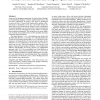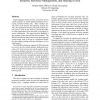319 search results - page 49 / 64 » Age-Based Garbage Collection |
206
click to vote
ASPLOS
2011
ACM
14 years 6 months ago
2011
ACM
nt, user-defined objects present an attractive abstraction for working with non-volatile program state. However, the slow speed of persistent storage (i.e., disk) has restricted ...
120
click to vote
PLDI
2011
ACM
14 years 5 months ago
2011
ACM
When dealing with dynamic, untrusted content, such as on the Web, software behavior must be sandboxed, typically through use of a language like JavaScript. However, even for such ...
249
click to vote
POPL
2007
ACM
16 years 2 months ago
2007
ACM
A memory leak in a garbage-collected program occurs when the program inadvertently maintains references to objects that it no longer needs. Memory leaks cause systematic heap grow...
113
click to vote
PLDI
2010
ACM
15 years 7 months ago
2010
ACM
Arrays are the ubiquitous organization for indexed data. Throughout programming language evolution, implementations have laid out arrays contiguously in memory. This layout is pro...
130
click to vote
OSDI
2000
ACM
15 years 3 months ago
2000
ACM
Single-language runtime systems, in the form of Java virtual machines, are widely deployed platforms for executing untrusted mobile code. These runtimes provide some of the featur...


